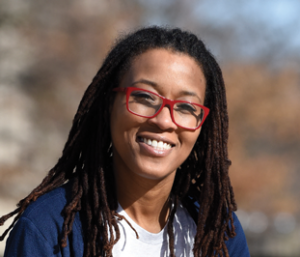
Washtenaw Community College has changed its general education requirements for associate degrees to ensure seamless transfer of courses to four-year colleges and universities across the state. These changes strengthen the college’s alignment with the Michigan Transfer Agreement.
The Michigan Transfer Agreement improves the transferability of core college courses between Michigan community colleges and four-year institutions. More than 70 percent of students entering WCC intend to transfer to a four-year intuition.
Given the college’s location in Ann Arbor, it’s not surprising that many WCC students look toward the University of Michigan to complete a bachelor’s degree. In fact, Washtenaw Community College sends more transfer students to U-M than any other community college.
While transferring to U-M can be a daunting process, WCC’s transfer coordinators provide the support services to make the transition as easy as possible.
WCC alumna L’Oreal Hawkes- Williams successfully transferred into U-M by taking advantage of the one-on-one academic advising, mentoring and support provided by WCC.
“The process of transferring to U-M was made less intimidating through WCC,” said Hawkes-Williams.
Hawkes-Williams got her start at WCC through organic gardening classes offered by the Community Enrichment department, which inspired her to enroll as a student where she developed a passion for biology. She credits Life Science faculty member David Wooten for inspiring her at WCC.
“I took every class he had to offer,” she said. “He had such an interactive style of teaching I really enjoyed.”
Today, Hawkes-Williams is majoring in Ecology and Evolutionary Biology at U-M and was selected to be part of the 2017 summer fellow cohort in the U-M student project incubator optiMize. Through funding from the project, Hawkes-Williams opened a self-sustaining hydro-garden in the Brightmoor neighborhood of Detroit. She hopes the garden will become a learning hub for hydroponic food growing, sustainability and ecology.
Max McVety is another student that successfully transferred to U-M from WCC.
For McVety, the decision to attend WCC before transferring to U-M was one of dollars and sense.
He knew he ultimately wanted to study engineering at the University of Michigan, but wanted to save some money along the way. For McVety, the only option he considered after high school was enrolling in WCC.
“I knew my family would help out with college costs as much as possible, but that probably wouldn’t cover the full cost,” he said. “So, attending WCC was good for me and my family.”
After completing a set of specified transfer courses at WCC, McVety transferred straight into the Michigan College of Engineering and earned a Bachelor’s of Science degree in 2016. Just one year into his mechanical engineering career, McVety proudly claims to be student debt free.
The WCC Board of Trustees approved the changes to the college’s general education requirements at its September 2017 meeting. These changes will ensure that students like Hawkes-Williams and McVety will be able to maximize the value of their WCC educational curriculum.
WCC’s transfer programming provides the support services to make the transition to the University of Michigan as easy as possible.
WCC offers students:
- One-on-one academic advising
- Mentoring support and advice to help make students as competitive as possible for admissions to U-M.
- Workshops and seminars with U-M staff and students to provide information about resources and services available, as well as networking opportunities.
- Assistance with the U-M application process.
For more information, contact WCC transfer coordinator Alexandra McCracken at [email protected] or 734-477-8519.
I knew my family would help out as much as possible, but that probably wouldn’t cover the full cost. So, attending WCC was good for me and my family.”
– Max McVety, WCC transfer student to the University of Michigan College of Engineering